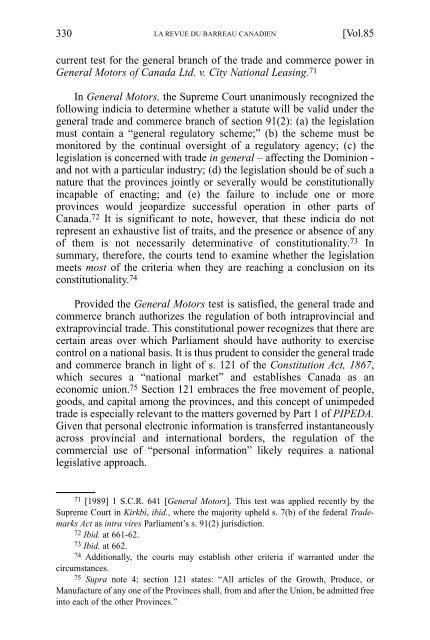PIPEDA: A CONSTITUTIONAL ANALYSIS - Goodmans
PIPEDA: A CONSTITUTIONAL ANALYSIS - Goodmans
PIPEDA: A CONSTITUTIONAL ANALYSIS - Goodmans
Create successful ePaper yourself
Turn your PDF publications into a flip-book with our unique Google optimized e-Paper software.
330 LA REVUE DU BARREAU CANADIEN<br />
[Vol.85<br />
current test for the general branch of the trade and commerce power in<br />
General Motors of Canada Ltd. v. City National Leasing. 71<br />
In General Motors, the Supreme Court unanimously recognized the<br />
following indicia to determine whether a statute will be valid under the<br />
general trade and commerce branch of section 91(2): (a) the legislation<br />
must contain a “general regulatory scheme;” (b) the scheme must be<br />
monitored by the continual oversight of a regulatory agency; (c) the<br />
legislation is concerned with trade in general – affecting the Dominion -<br />
and not with a particular industry; (d) the legislation should be of such a<br />
nature that the provinces jointly or severally would be constitutionally<br />
incapable of enacting; and (e) the failure to include one or more<br />
provinces would jeopardize successful operation in other parts of<br />
Canada. 72 It is significant to note, however, that these indicia do not<br />
represent an exhaustive list of traits, and the presence or absence of any<br />
of them is not necessarily determinative of constitutionality. 73 In<br />
summary, therefore, the courts tend to examine whether the legislation<br />
meets most of the criteria when they are reaching a conclusion on its<br />
constitutionality. 74<br />
Provided the General Motors test is satisfied, the general trade and<br />
commerce branch authorizes the regulation of both intraprovincial and<br />
extraprovincial trade. This constitutional power recognizes that there are<br />
certain areas over which Parliament should have authority to exercise<br />
control on a national basis. It is thus prudent to consider the general trade<br />
and commerce branch in light of s. 121 of the Constitution Act, 1867,<br />
which secures a “national market” and establishes Canada as an<br />
economic union. 75 Section 121 embraces the free movement of people,<br />
goods, and capital among the provinces, and this concept of unimpeded<br />
trade is especially relevant to the matters governed by Part 1 of <strong>PIPEDA</strong>.<br />
Given that personal electronic information is transferred instantaneously<br />
across provincial and international borders, the regulation of the<br />
commercial use of “personal information” likely requires a national<br />
legislative approach.<br />
71 [1989] 1 S.C.R. 641 [General Motors]. This test was applied recently by the<br />
Supreme Court in Kirkbi, ibid., where the majority upheld s. 7(b) of the federal Trademarks<br />
Act as intra vires Parliament’s s. 91(2) jurisdiction.<br />
72 Ibid. at 661-62.<br />
73 Ibid. at 662.<br />
74 Additionally, the courts may establish other criteria if warranted under the<br />
circumstances.<br />
75 Supra note 4; section 121 states: “All articles of the Growth, Produce, or<br />
Manufacture of any one of the Provinces shall, from and after the Union, be admitted free<br />
into each of the other Provinces.”
















